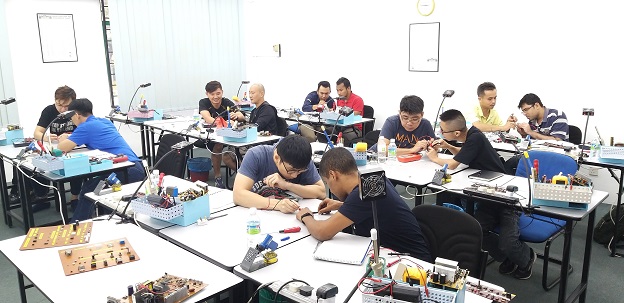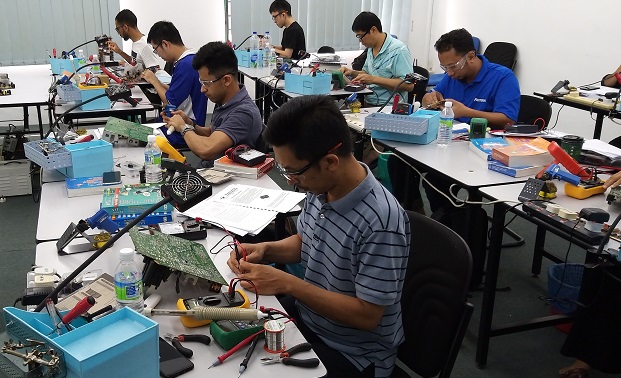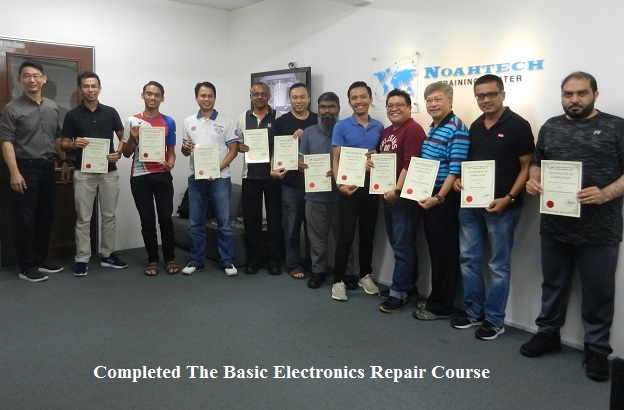
Course Code: BEC01 (Level 1)
Course Length: 3 days
INTRODUCTION
This course is tailored to individuals who are new and have some experience in the field of electronics. There is no prerequisite eligibility are required , so almost any student that is not from technical background can easily join this Basic Electronics Repairing course.
TARGET GROUP
The Basic Electronics Troubleshooting And Repair course is targeted at SPM/STPM school leavers, Technical College Students, Technicians, Service Engineers, Retirees, Electronic Hobbyists and those who are interested in Electronics Repair.
COURSE OBJECTIVES
At the end of the course, participants will be able to:
- Know the important of safety precaution when dealing with AC and DC electronic circuit.
- Assemble a LED tube light and how AC and DC works in this device.
- Use an analog/digital multimeter to measure voltage, current, resistance and continuity for troubleshooting purposes
- Differentiate between AC and DC circuit.
- Remove and solder electronic components from and onto PCB board.
- How to protect PCB board from moisture, water and vibration.
- Use the right chemical spray to clean PCBs.
- Understand how electronics components work with the help of diagrammatic explanation.
- Calculate the code value of resistors, potentiometers and capacitors
- Identify and test most of the basic electronic components so that troubleshooting work can be performed on electronics equipment.
- Read semiconductor substitution manual book and find the best replacement parts from search engine.
- Understand Semiconductor Part Number and Datasheet specifications
- Read basic electronic schematic diagram of a typical equipment
- Build two electronics project kits that can enhance their testing and soldering skills
- Design their own Linear Power Supply
- Know where to buy electronics parts locally and internationally
- See the functions of specialized test equipment (ESR and Ring Tester) in checking different types of electronic components.
- Understand the important of Pure Copper Grounding cable and how it can enhance the performance of an Automobile. They will also learn the right way to measure the DC current flow on those cables installed and the right lug size to use.
- Know how Supercapacitors in a car can help to prolong the life of the car battery. And how it can deliver much faster current than an Alternator.
- Analyse a DC circuit board to find out how significant a bad component can impact the function of the circuit.
- Troubleshoot a given circuit board with real bad components in it.
- Understand the 10 ways how one can improve their electronics repair skills.
- Develop a technical mindset/knowhow and be able to think on their own (how to fix technical issues and find a solution) how to handle technical works without much supervision.
- and many more.
- Prepare to undertake the level 2 Advanced Electronics Repair Course

PRE-REQUISITES
- No prior knowledge required.
- Able to understand simple English.
- Have interest and passion in electronics.
The course materials, lectures and lab exercises are in English.
(Upon request, the lecturer can explain in Mandarin and Bahasa Malaysia)
BENEFITS OFFERED
UPON SIGNING UP FOR THE COURSE, PARTICIPANTS ARE ELIGIBLE FOR:
1. Long term technical support by Noahtech through email and Whatapp. You will never be left alone after the course. Any electronics repair questions just call, email or Whatapp us.
2. A Participant Workbook which contains:
- Explanation on safety measures.
- Diagrammatic explanation on how to assemble a LED lamp.
- Explanation on ohm’s law.
- How to use a multimeter to check AC/DC voltage and current, and resistance.
- Explanation on functions, recognition, symbol , calculation and checking basic electronic components such as
- Resistors
- Preset/variable resistors
- Diodes
- Bridge Rectifiers
- Capacitors
- Fuse
- Transistor NPN/PNP
- Transistor FET N/P channel
- Darlington Transistor
- Horizontal Output Transistor
- Intergrated circuit
- Coils/Inductors
- Zener Diodes
- Transformers
- LEDs
- How to read semiconductor data book.
- How to build electronics project kit.
- Transistor data for 2SA, 2SB, 2SC, 2SD, 2SJ and 2SK.
- CMOS IC HANDLING PRECAUTIONS.
- Voltage Regulator 7800 and 7900 series specification.
- The right test equipment to check the electronic components
- Chart of electronic components schematic symbols.
- Resistor color code chart.
- Capacitor code and conversion chart.
- Suggested technical reference book.
- Technical Terms (Glossary).
3) Certificate of Completion will be awarded upon completion of the course.

The workbook will be given when the workshop begins.
Course starts at 9.00am to 5.00pm
Click here to print out the course outline or right click to save the file.
The above contents are subject to change without prior notice
In order to view student’s real life testimonials please visit this link.
NOTE: We limit to small number of participants per class to maximize attention so book early to secure a seat and to avoid disappointment. Click here for the course schedule. For more information, inquiries and registration please contact us HERE.
Check out my Blog HERE and the photos of graduates HERE

